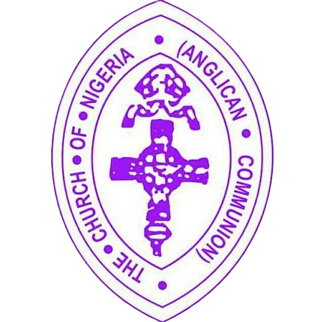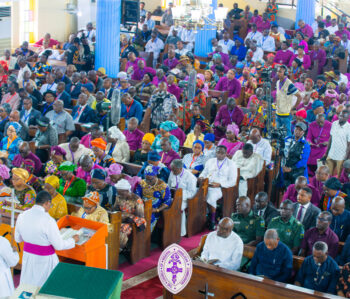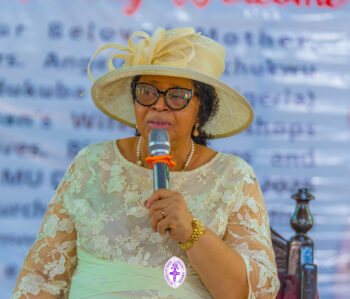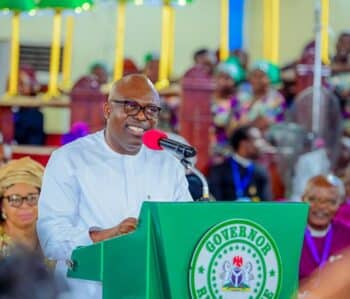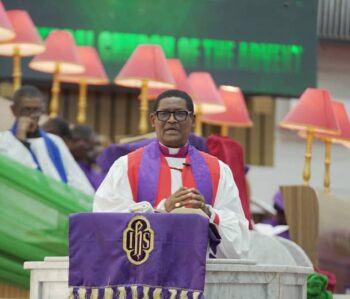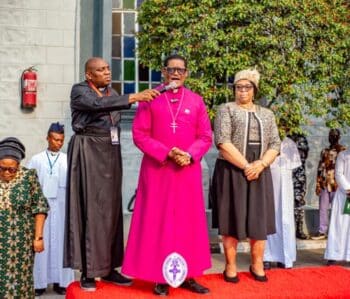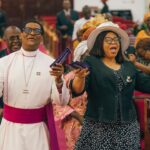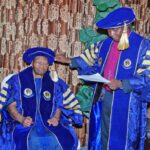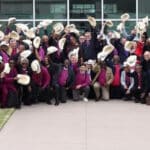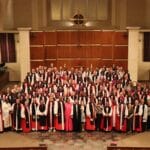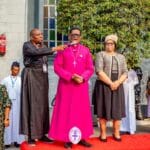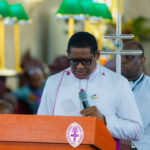- Adesewa Orioye
- May 29, 2024
- 0 Comments
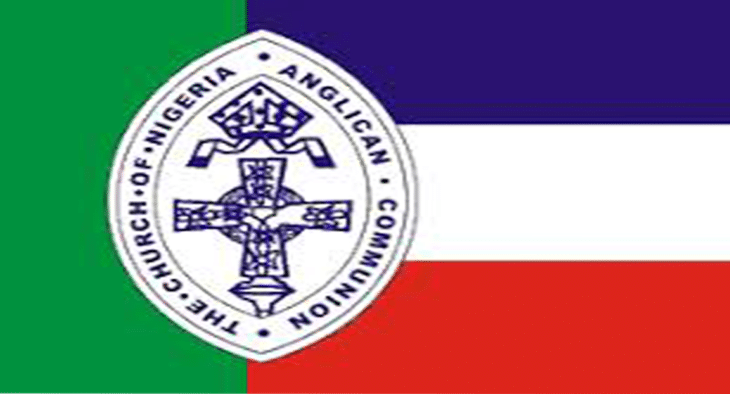
Here are some major things to know about the Church of Nigeria (Anglican Communion).
- The Church of Nigeria is the Anglican church in Nigeria. It is one of the largest Provinces in the Anglican Communion.
- It came out of the Province of West Africa and was inaugurated as an independent national Province on February 24, 1979 – St Matthias Day. There were 16 Dioceses at inauguration.
- The Vision: “The Church of Nigeria shall be Bible-based, spiritually dynamic, united; disciplined; self-supporting; committed to pragmatic evangelism, social welfare and a church that epitomizes the genuine love of Christ.”
- It is thoroughly evangelical in its theology. Its theology is fashioned by the Bible and yet there is room for tradition and reason in theological engagements and interpretation.
- Scripture
- Tradition
- Reason
(Richard Hooker)
- It shares and affirms the 39 Articles of Religion (Article of Faith).
- Since 2002 the Church of Nigeria is organised into 14 internal ecclesiastical provinces.
The 14 Provinces of the Church are:
- Abuja Province
- Aba Province
- Lokoja Province
- Kaduna Province
- Owerri Province
- Lagos Province
- Niger Province
- Niger Delta Province
- Jos Province
- Kwara Province
- Ibadan Province
- Ondo Province
- Bendel Province
- Enugu Province
Each Province is headed by the Ecclesiastical Archbishop who is elected to serve for a term of five years and can be so elected the second time and no more.
Becoming an Ecclesiastical Archbishop is by election not appointment.
- It operates the Anglican polity of being “episcopally led and synodically governed.
- It has rapidly increased the number of its dioceses and bishops from 91 in 2002 to 164, as at today, May 28, 2024. The administrative headquarters is located in Abuja (St Matthias House, Plot 942 Ibrahim Waziri Crescent, Gudu District, Abuja). St Matthias House, Gudu, Abuja, its National Secretariat was built and commissioned for use during the Primacy of Archbishop Nicholas D. Okoh. It was dedicated on 24th April 2019.
- It prides itself as the Church of the Great Church father Bishop Samuel Ajayi Crowther the first black Anglican Bishop who with others pioneered missions into the different parts of Nigeria. Remember the Anglican Church started in Nigeria in 1842. Many institutions have been named after Bishop Crowther –
- Crowther Graduate Theological Seminary, Abeokuta, Ogun State
- Bishop Crowther College of Theology, Okene, Kogi State
- Crowther Mission Center, Osoogun, Oyo State
- Crowther Radio, Abuja
- Crowther Chariots, Abuja.
- Many Cathedral stalls, hostels, houses, books, theses and dissertations have been written on Bishop Crowther
Some people have suggested that he be named the first Primate of the Church of Nigeria, this cannot be, because the Church of Nigeria became a province, a status that gave it the right to have Primate as its leader in 1979.
All the same, Bishop Samuel Ajayi Crowther is loved and celebrated in the Church of Nigeria – October 3 is his Day.
- The Church of Nigeria has been headed by five Primates till date.
- Its fifth and current primate is Archbishop Henry C. Ndukuba (2020 till date).
- Archbishop Timothy Olufosoye was the first Primate from St Matthias Day in 1979 till 1988.
- Archbishop Joseph Abiodun Adetiloye was the second Primate (1988-1999).
- Archbishop Peter Jasper Akinola became the third Primate (2000 – 2010).
- Archbishop Nicholas D. Okoh was the fourth Primate (2010-2020).
- Autonomy: The Church of Nigeria is an autonomous Province within the Anglican Communion and does not report to the Archbishop of Canterbury. It became an autonomous Province in 1979 (24th February – St Matthias Day).
- Primacy: The Primate of the Church of Nigeria is the head of the Nigerian Anglican Church, similar to how the Archbishop of Canterbury is the spiritual leader of the Church of England.
- The Primate is elected at the Episcopal Synod for a single term of 10 years after which he retires even if he has not reached the constitutional mandatory retirement age of 70.
Also, if he reaches 70 years before his 10 years term he will also retire because the constitutional mandatory retirement age of 70 supersedes the 10 years term.
The Primate is the Archbishop and Metropolitan. He is also the Bishop of the Diocese of Abuja and the Dean of his Cathedral.
- The Dean of the Church of Nigeria deputizes for the Primate. His roles are as assigned by the Primate. The first elected Dean to serve the full five-year nonrenewable term was the Most Rev’d Lamido A Buba, the former Archbishop of Kaduna Province and Bishop of the Diocese of Wusasa.
The current Dean is the Most Rev’d Blessing Enyindah, the Archbishop of Niger Delta and the Bishop of the Diocese of Ikwerre.
- The General Synod meets once in 3 years, and it is the highest decision-making body of the Church. There are two secretaries of the General Synod who serve as minutes recorders during sessions and even during Standing Committee Meetings. 1. Clerical Secretary 2. Lay Secretary
This helps you to know then that the General Secretary is an administrator not a recorder of notes – of course he takes notes at exclusive meetings for the purpose of administration with the Primate.
Whereas these two record proceedings, the General Secretary is the custodian of minutes and other documents of the church.
The General Synod, Standing Committee and Diocesan Synods are made up of:
- The House of Bishops chaired by the Primate
- The House of Clergy chaired by the Prolocutor
- The House of Laity chaired by the Chairman
The Standing Committee of the General Synod meets twice a year to execute the decisions of the General Synod and take other decisions which will eventually be ratified by the General Synod.
Critical voting at such meetings are handled based on Houses. The Primate is the President of the General Synod and the Standing Committee who gives Primatial Address pointing clearly the direction the church is going within the period.
- Its Priests and Bishops retire at the age of 70. Retirement is only in terms of administrative engagement, but the priest remains a priest and the bishop remains a Bishop with full capacity to officiate when invited to do so by the Primate or any Diocesan Bishop.
So technically speaking, the Priests and Bishops do not retire from ministry, they retire from administrative work.
- It maintains 3 Order of Ministry;
- The Deacon
- The Priest
- The Bishop
- Bishops are elected not appointed from the House of Clergy of the Church of Nigeria or of Churches that are in communion with the Church of Nigeria. A clergy must possess certain qualifications and be of certain age to be ordained a Deacon, Priest and elected a Bishop based on the Constitution. Election of Bishops is a sole responsibility of the House of Bishops under the guidance of the Holy Spirit and presided by the Primate. The vacant Diocese only participates by giving an Advisory to the House of Bishops on the kind of Bishop they think can fit their Diocese – but it only an advisory that the House of Bishops under the guidance of the Holy Spirit can do otherwise.
Bishops are not elected at any meeting of the House of Bishops. The meeting for the election of Bishops is called the Episcopal Synod. This synod is exclusively for the House of Bishops – no clergy or laity is invited and allowed to be part of it.
- It has a Bishop Theologian who is in charge of all matters about the theology of the Church and also oversees the theological trainings and schools. The first and current Bishop Theologian of the Church is the Rt Rev’d Prof. Dapo Asaju. He is also the current Bishop of Ilesa Diocese in the Province of Ibadan.
- The Diocesan Bishops are the episcopal leaders of the Dioceses who lead and are assisted by the Diocesan Synods and Diocesan Boards.
The governance of the Archdeaconry is by the Archdeacon assisted by the Archdeaconry Board
The governance of the Parish is by the Vicar assisted by the Parish Church Council (PCC) and the Vestry (Annual General Meeting).
- The Dioceses of the Church of Nigeria are autonomous, but their autonomy is in communion. What this means is that they are at liberty to govern themselves based on their context without undermining the general principles that bind them all together as a national province. So, the church practices autonomy-in-communion. At every consecration service, each Bishop-elect pledges loyalty to God, the Church, and the Primate which shows clearly the need for autonomy-in-communion.
- Theologically Biblical: The Church of Nigeria is Bible-based and generally more theologically conservative compared to the Church of England and the Archbishop of Canterbury.
It upholds the Chicago-Lambeth Quadrilateral
- Holy Scriptures – Old and New Testaments
- The Creeds – Apostles and Nicene – Athanasian
- Sacraments -Baptism and Holy Communion
- Historic Episcopate – Bishops – Apostolic succession
- Scriptural Authority: The Church of Nigeria places a strong emphasis on the authority of Scripture, often leading to different interpretations and stances on social and moral issues against what other liberal provinces hold. It is a Bible-based Church.
- LGBTQ+ Issues: The Church of Nigeria has taken a strong stance against the acceptance and blessing of same-sex relationships, in contrast to more liberal views held by some in the Church of England and in other liberal provinces. It does not subscribe or approve of same sex marriage, same sex couple, gay, homosexuality, lesbianism because they are outright practices which are against the Holy Scripture.
This is the reason why it severed its relationship with the Episcopal Church in America and in Canada and changed its constitution to that effect in 2005. It later with other evangelical Provinces started GAFCON and has continued to be the leading Province in the fight against all practices that are contrary to the Word of God that some liberal provinces of the communion have embraced.
To this date, Church of Nigeria does not submit or attend any meeting called by the Primate of Canterbury or the General Secretary of the Anglican Communion.
It does not attend the Primate’s Council
It does not attend the Anglican Consultative Council
It does not recognize the authority of Canterbury or the Primate of Canterbury
It is ever ready to work and walk with only those who love God and are willing to uphold the authority of the Holy Scripture and the supremacy of Jesus Christ as the one and only Saviour.
- GAFCON: The Church of Nigeria is a founding and leading member of the Global Anglican Future Conference (GAFCON), which was formed as a response to what they perceive as a drift from biblical and traditional Anglican teachings. The House of Bishops boycotted the Lambeth Conference of 2008 and the fifteenth Lambeth Conference of 2022 because of the unbiblical stands of the Archbishop of Canterbury and others on the authority of the Holy Scripture especially on marriage and human sexuality.
It affirms the Jerusalem Declaration of GAFCON 2008 and the GAFCON Statement of Kigali 2023.
- The Clergy are addressed based on their office or order of Ministry.
The Deacon is addressed as The Reverend or the Rev., the Rev’d
The Priest is addressed as The Reverend or the Rev., the Rev’d
The Canon whether Honourary or Statutory is addressed as The Reverend Canon or the Rev. Canon, the Rev’d Canon
The Archdeacon is addressed as the Venerable or the Ven.
The Sub-Dean is addressed the Venerable or the Ven. Some Dioceses addressed him as the Very Reverend or the Very Rev., or the Very Rev’d
The Dean is addressed as the Very Reverend or the Very Rev., or the Very Rev’d – some dioceses maintained the title of Venerable for the Dean.
The Provost is addressed as the Very Reverend or the Very Rev., or the Very Rev’d
These are the titles of the Clergy in the Church of Nigeria
The Archbishop is called the Most Reverend – The Most Rev. or The Most Rev’d or The Most Rev’d
If the Archbishop is present he is addressed as “Your Grace, …”
In his absence he is addressed as “His Grace, …”
The Bishop is called the Right Reverend – The Rt Rev. or The Rt Rev’d or The Rt Rev’d
If the Bishop is present he is addressed as “Your Lordship, …”
In his absence he is addressed as “His Lordship, …”
The argument on the usage of small l or capital L is not necessary because it is only noticed when written. Whichever one suits the writer is acceptable.
- Mission and Evangelism: The Church of Nigeria prioritizes mission and evangelism, focusing on church planting and growth within Nigeria and abroad.
- Cultural Context: The Church of Nigeria operates within a unique cultural context, which influences its practices and theological emphases.
- Details of the colours on the Church of Nigeria’s flag and lapel
- Red = the blood of Jesus & martyrdom
- Blue = the love of God
- White = the peace of God
- Green = growth and life
- Relationship with Other Provinces: The Church of Nigeria often aligns itself with other theologically conservative provinces in the Anglican Communion, such as those in Uganda, Rwanda, Kenya, and America (ACNA) and so on.
- Education and Social Services: The Church of Nigeria is heavily involved in education, healthcare, and other social services, reflecting its commitment to holistic ministry.
It has three fully functional Universities owned by joint provinces or Dioceses.
- Ajayi Crowther University, Oyo
- Paul University, Awka
- University on the Niger
Walter Miller University is being build near Abuja located in Niger State
The National Church is still working on the Anglican University of Technology, Kweita in Abuja
There are colleges and schools of Nursing, Health Technology etc.
There are also monotechnics and polytechnics.
Secondary and primary schools in their great numbers located in different Dioceses.
It has many theological seminaries and colleges with 7 recognized by the headquarters for subvention purposes.
It has a graduate school called Crowther Graduate Theological Seminary (CGTS) in Abeokuta, Ogun State, Nigeria.
It has Relief and Welfare Team that works with the Primate in reaching out to churches and communities in need.
It has a faith based organization called the Anglican Compassion And Development Initiative (ACADI) operational in all Dioceses with the National Head Office at Abuja headed by the National Coordinator.
- Liturgical Practices: While sharing common liturgical roots, the Church of Nigeria has developed distinct worship practices that reflect its cultural context. Church of Nigeria has its own worship manuals, the Book of Common Prayers and Hymnal. Incidentally in the Anglican Communion worldwide, the Episcopal Church of the United States of America and Church of Nigeria are the two national Churches that have distinctive hymnals.
- Ecumenical Relations: The Church of Nigeria engages in ecumenical relations with other Christian denominations within Nigeria and beyond. For example, It has a Church in Port Harcourt Nigeria – Christ Church Port Harcourt – where in ecumenism the Anglicans, Methodists and Presbyterians worship together with each denomination providing the leading Reverend for the single term of 3 years in a rotational basis just to mention a few.
It is involved in ecumenical initiatives and fellowships with other Christian denominations. It is a member of the World Council of Churches (WCC), All Africa Conference of Churches (AACC), Christian Association of Nigeria (CAN), Christian Council of Nigeria (CCN), etc.
- Governance: The Church of Nigeria has its own governance structures, including synods and councils, which operate independently of the Church of England.
- Youth and Women’s Ministry: The Church of Nigeria places a strong emphasis on youth and women’s ministries, recognizing their vital role in the church’s mission. The youths of the Church have a fellowship called the Anglican Youth Fellowship (AYF). It also has an annual International youth conference called the Joshua Generation International Youth Conference (JGIYC) which was inaugurated by the current Primate in 2021.
- Interfaith Relations: The Church of Nigeria actively engages in interfaith dialogue, particularly with the Muslim community in Nigeria.
- Training and Formation: The Church of Nigeria invests heavily in the training and formation of clergy and lay leaders through theological colleges and seminaries.
- Response to Secularism: The Church of Nigeria often critiques secularism and advocates for a strong Christian witness in public life.
- Historical Ties: Despite historical ties with the Church of England, the Church of Nigeria has sought to establish its own identity and direction.
- Global South Influence: The Church of Nigeria is a leading voice within the Global South Anglican churches, advocating for a return to biblical and traditional Anglican values.
- Posting and transfer of the clergy is the prerogative of the Bishop and the congregations are expected to obey by supporting their clergy to transition from one station to another. Both the Clergy and the Laity of the Diocese took an oath or pledge of loyalty to the Bishop at his enthronement and are constitutionally bound to respect and obey the orders of the Bishop in the governance of his jurisdiction.
- It has ministry to the whole family –
- Christian Men Fellowship (CMF)
- Women Ministry
- Mother’s Union
- Women’s Guild
- Ladies Guild
- Girls Guild
- Boys and Girls brigade
- Anglican Children Ministry (ACM)
- Operation Samuel for young boys
- Anglican Youth Fellowship (AYF)
- Evangelical Fellowship in the Anglican Communion (EFAC)… Etc
- The Ministry of the Women is under the Wife of the Primate who is the President of the Mothers Union, Women’s Guild, Ladies Guild and Girls Guild. The current President is Mrs Angela E. Ndukuba.
- It does not ordain women into its priesthood but accepts them into lay pastoral ministry as Lay Readers, Evangelists, and leaders of other groups and fellowships etc. There was a time a vote was taken on this matter, but it ended with the church voting to maintain status quo in not admitting women into the Holy orders.
- It does not approve all kinds of vestments for her priests and Bishops – vestments from other Anglican provinces that are not approved are not accepted – Diocesan Bishops are the guardians of the liturgy and vestments of their Dioceses as agreeable to what the House of Bishops prescribed. Note, that every vestment worn by the priests or bishops has the message it conveys.
- The Diocesan Constitution cannot be operational until it has been approved by the Standing Committee acting on the authority of the General Synod having been processed and passed by the Committee of Reference which examines all Diocesan Constitutions to make them align with the Constitution of the National Church. The Committee of Reference is headed by the Registrar of the Church of Nigeria
- It has its Mission and Missionaries in other parts of the world especially
- The Nigerian Chaplaincy in the UK
- Church of Nigeria North America Mission (CONNAM) in North America and Canada
- West Africa Mission
- Europe Mission
- Persian Gulf Mission
- Equatorial Guinea Mission, Etc
All these are coordinated by the Mission Board, the Director of Mission and the Executive Secretary of the Church of Nigeria Missionary Society (CNMS).
Some of these Missions are coordinated by the founding Diocesan Bishops. CONNAM which is Church of Nigeria North America Mission has 4 Missionary Bishops and some Canon Missioners who oversee the different Missionary Areas in North America and Canada.
All missions of the Church operate under the direct supervision of the Primate.
The Coordinating Bishop of CONNAM operates under the direction of Primate.
The current Coordinating Bishop of CONNAM is the Rt Rev’d Dr Nathan Kanu, who is also the Bishop of Diocese of Aba Ngwa North.
The Coordinating Bishop of UK and Europe and Persian Gulf Missions is the Rt Rev’d Ben A Enwuchola, who is also the Bishop of the Diocese of Otukpo.
- Not all the Bishops of the Church are Diocesan Bishops – there are those who are in other mission and ministries of the church. Currently there no Suffragan Bishops as the last General Synod resolution made them Missionary Bishops in the light of the dissolution of its Dioceses in North America.
- It has a television Station called the Advent Cable Network Nigeria (ACNN TV) which has a sole goal of preaching the undiluted Gospel of Christ Jesus. It was established in September, 2013. It is currently headed by the General Manager Akintunde Korede Johnson who works with the Board of the TV Station. He also currently heads the directorate of communication for the Church of Nigeria, Anglican Communion.
- It has Chancellor and Registrar who are qualified legal men serving as advisers and guardians to the church on issues that has to do with the laws of the land vis-a-vis the Canon law.
The Chancellors, Registrars, Legal Officers of the different Dioceses hold their annual conference in Abuja to pray together and educate themselves on their advisory roles in the Dioceses. This conference is organized by the Registrar of the Church of Nigeria in consultation with the Chancellor of the Church of Nigeria.
The Chancellor of the Church of Nigeria is Honourable Henry Odein Ajumogobia, SAN
And
The Registrar of the Church of Nigeria is Mrs Kehinde Ajoni – she took over from Barr Dr Abraham Yisa who served for 18 years in this office.
- It holds an annual spiritual awakening gathering called Divine Commonwealth Conference (DIVCCON) at Abuja every November for a week. Archbishop Bishop Tunde Adeleye (Rtd) is the Coordinator and Bishop Akobe Steven, the Bishop of Kabba Diocese was recently appointed as the Deputy Coordinator.
- The administrative head of the Secretariat of the Church of Nigeria at Abuja is the General Secretary of the Church of Nigeria. The General Secretary is appointed to serve for a full term of 5 years and can be renewed at the discretion of the Primate with the Standing Committee confirmation. The current General Secretary, Venerable Dr. Paul Dajur, served the full term and has received a 3 years renewal by the Primate confirmed by the General Synod. He assumed this office on February 23, 2018.
- The Church is self-supporting, self-evangelizing or self-propagating, and self-governing. It does not derive its authority of operations from the Archbishop of Canterbury. No sponsorship from Canterbury or America – God’s people in Nigeria raise money for the mission the church is doing within and outside Nigeria. To God be the glory. Amen
Written By the Venerable Dr Gershinen Paul Dajur who is the Current General Secretary of the Church of Nigeria (Anglican Communion).
Compiled by Engr Korede Akintunde, the Communication Officer of the Church of Nigeria (Anglican Communion).
29/05/2024
Enquiry: communication@anglican-nig.org
